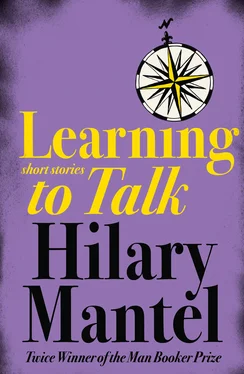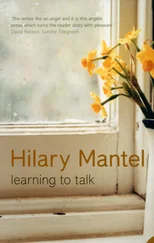The gardens at the back of the houses were long narrow strips, fading by way of ramshackle fences into grey cowpat fields. Beyond the fields were the moors, calm steel-surfaced reservoirs and the neat stripes of light and dark green conifers which mark out the good offices of the Forestry Commission. Little grew in these gardens: scrub grass, tangles of stunted bush, ant-eaten fence poles and lonely strands of wire. I used to go down to the bottom of the garden and pull long rusty nails out of our rotting fence; I used to pull the leaves off the lilac tree, and smell the green blood on my hands, and think about my situation, which was a peculiar one.
Bob and his family had come to live next door to us in some early, singular transplantation from the city. Perhaps this accounted for his attitude to his land. We viewed with distrust the handful of wormy raspberries the garden produced by itself, the miserable lupins running to seed; the straggling rhubarb was never cut and stewed. But Bob had fenced in his garden like the propositions central to a man’s soul: as if he had the Holy Grail in his greenhouse, and the Vandals were howling and barracking in the cowpat fields. Bob’s garden was military, it was correct; it knew its master. Life grew in rows; things went into the ground out of packets and came up on the dot and stood straight and tall for Bobby’s inspection. Unused flowerpots were stacked up like helmets, canes bristled like bayonets. He had possessed and secured every inch of the ground. He was a gaunt man, with a large chin and a vacant blue eye; he never ate white sugar, only brown.
One day over the fence erupted Myra his wife, about my mother’s immoral way of life; twittering in incoherent and long-bottled rage about the example set to her children, to the children of the gardens around. I was eight years old. I fixed her with my very gimlet eye, words of violence bursting into my mouth, contained there swilling and bloody, like loose teeth. I wanted to say that the children of these tracts of ground – her own in particular – were beyond example. My mother, at whom the tirade was directed, got up slowly from the chair where she had been taking the sun; she gave Myra one cursory unregarding glance, and walked silently into the house, leaving her neighbour to hurl herself like a crazed budgerigar at Bob’s good fences. Myra was little, she was mere, rat-faced and meagre, like a nameless cut in a butcher’s window in a demolition area. In my mother’s view, her arms hung below her knees.
I think that before this the two households had been quite friendly. Increasingly, then, Bob and his preoccupations (nine bean-rows will I have there, a hive for the honey-bee) became the butt of our secret sniggers. Bob slunk nightly into the garden, to be away from the stewing-cut his wife. When his mysterious grubbings were done, his drillings and ploughings, he stood by the fence and lifted lacklustre eyes to the hills, his hands in his pockets; he whistled an air, tuneless and plaintive. From our kitchen he could just be seen, through the clammy evening mists that were the climate of those years. Then my mother would draw the curtains and put the kettle on the gas, and bemoan her life; and she would laugh at Bobby boy, and wonder what damage would be done before he stood there again next day.
For Bob’s fences were not secure. They were elaborate, they were refined, you might say they were highly strung, though this is a strange word to apply to a fence. They were like Stendhal on the shelves of the village library: impressive, but not adapted for any purpose we could discern. The cows would get in; we would watch them nosing softly in the dawn or dusk, lifting Bobby’s neat catches with their heads; and trample, they came, slurping and crunching on his succulent produce, satisfying each of their four stomachs, their ruminant eyes mildly joyous with the righteousness of it all.
But Bob had a low opinion of bovine intelligence. For leaving the gates open, he would thrash his son Philip. From behind our own stone walls we would hear Bobby’s demented passions pouring out, his great explosions of grief and despair at the loss of his cucumber frames, wails torn out of his gut. This state of affairs afforded some satisfaction to me. I had some friends; or rather, there were children of my own age. But because my mother kept me away from school so often – I was sick with this and I was sick with that – I was a strange object to them, and my name, which was Liam, they said was ridiculous. They were wild children, with scabbed knees, and hearts full of fervour, and intolerant mouths and hard eyes; they had rites, they had rules, and they made me an outsider in the tribe. Being ill was almost better; it is something you must do alone.
When I did appear at school, it was seen that I had fallen behind with the lessons. Mrs Burbage was our teacher, a woman of perhaps fifty, with sparse reddish hair, and fingertips yellow from cigarettes. She told me to stand up and explain the proverb ‘Never spoil the ship for a ha’pennyworth of tar’. In those days that was how children were educated. She carried a bulging tartan bag with her, and each morning deposited it, with a plump thud, on the floor by her desk; then in no time at all the shouting and hitting would begin. It was a tyranny, under which we laboured, and while we dreamed of retaliation, a year of our childhood slid by, unnoticed. Some of the children were planning to kill her.
There was nature study; while we sat with our arms folded behind our back, she read to us about the habits of the greenfinch. In spring there was pussy willow, which is thought to be of interest to children everywhere. But it is not spring that I remember: rather those days when the lights were on by eleven o’clock, and wet roofs and the mill chimneys shivered behind a curtain of water. At four o’clock the daylight would almost have vanished, sucked away into the dark sky; our Wellingtons squelched in the mud and dead leaves, and breath hung like disaster on the raw air.
The children had been listening in to their parents’ gossip. They asked me – the girls especially – searching questions about the sleeping arrangements in our house. I did not see the point of these questions, but I knew better than to answer them. There were fights – scrapping and scratching, nothing serious. ‘I’ll show you how to fight,’ the lodger said. When I put his advice into practice I left tears and bloody noses. It was the triumph of science over brutality, but it left a sick taste in my mouth, a fear of the future. I would rather run than fight, and when I ran the steep streets turned misty and liquid before my eyes, and the marching fence of my ribs entrapped my heart like a lobster in its pot.
My relations with Bob’s children had little to commend them. Quite often, when I was playing outside, Philip and Suzy would come into their own garden and throw stones at me. Looking back, I don’t know how there could have been stones in Bobby’s garden; not stones just lying about, for use as casual missiles. I suppose if they found any they thought they were doing their father a favour by lobbing them over at me. And as he got stranger, and more persecuted, and ate ever more peculiar foods, no doubt they had to jump at the chance to do him a favour.
Suzy was a hard little madam, with an iron-wide mouth like a postbox; she hung on the gate and taunted. Philip was older than me, perhaps by three years. He had a modified coconut head and a puzzled narrow grey eye, and a sort of sideways motion to his neck, as if constantly in training to avoid the blows he got on account of the cows; perhaps he was concussed. As for the missiles, it didn’t give me much trouble to stay out of the small range of his accuracy; but when I evaded him once too often, when I saw I was making him look a fool, I would get myself indoors, because I saw in his face a sort of low destructive rage, as if some other creature might break through, a wilder beast; and it is true that I have seen this look since, on the faces of large intelligent dogs that are kept tied up. And by saying this I do not mean that I thought Philip was an animal, then or now; what I thought was that we all have a buried nature, a secret violence, and I envied the evident power of his skinny sinewy arms, veined and knotted like the arms of a grown man. I envied him, and loathed his subject nature, and I hoped it was not my own. Once I scrabbled for clods of earth and sticks and hurled them back howling like a demon, with all the invective I had at my command from the books I had read: varlet, cuckold, base knave and cur.
Читать дальше












